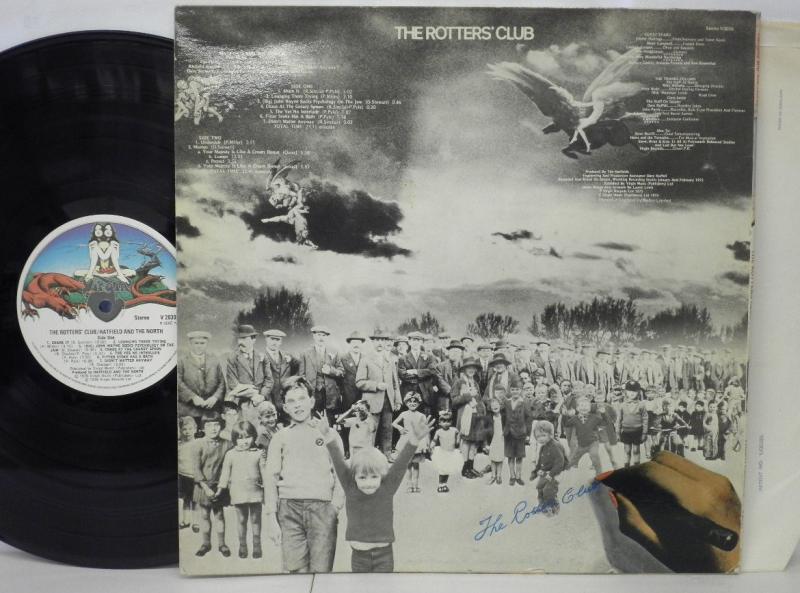
Hatfield and the North sought non-stop laughter to dispel disaster and shared it with progressive jazz rock interludes and chaotic lounge lumps. The group grew out of a number of bands in the Canterbury scene including Phil Miller (from Matching Mole), his brother Steve Miller (from Caravan), Pip Pyle (from Gong) and Richard Sinclair (from Caravan). Dave Sinclair (from Matching Mole and Caravan) replaced Steve Miller and group became Hatfield and the North, taking their name from a highway sign in the area. Dave Sinclair was replaced by Dave Stewart (from Egg) and they recorded their eponymous debut in 1974 with producer Tom Newman.
Richard Sinclair reveals: "For my part, I was born in Canterbury and my parents and my grandparents, were musicians. My father had a dance band that played every weekend in Canterbury and the parents of Hugh and Brian Hopper used to go to see the 'Dick Sinclair Band'...and they talked about 'us sons' one evening. Hugh and Brian needed a guitar player and so my dad kitted me out with his Selmer Truvoice amp. And I went to meet them. I was then 15 years old, and that was the start of the 'Wilde Flowers' me, Hugh and Brian Hopper. A few years passed and the Wilde Flowers grew to include, Robert Wyatt, Kevin Ayres, Pye Hastings, Richard Coughlan, Daevid Allen, and others. 'Soft Machine' and 'Caravan' were formed from the generic Wilde Flowers. 'Kevin Ayres and the Whole World' and 'Gong' came about later. So it's good that the whole group of mates known as the 'c'bury scene' are considered to be progressive, I hope that the genre and the music, carry on progressing and do not stand still! Get on your feet and get on up!... I would say that you need a sense of humour to be a musician in the first place! I was raised on the themes of my dad such as "never let your braces dangle" and "does your chewing gum loose it's flavor on the bedpost overnight" humor as a vital ingredient to learning to play."
Their second and final album 'The Rotters' Club' features Phil Miller on guitar; Dave Stewart on Fender Rhodes electric piano, Hammond organ, Minimoog, Piano, and Tone generator; Richard Sinclair on bass guitar, lead vocals, and guitar; and Pip Pyle on drums; with Jimmy Hastings on saxophone and flute; Lindsay Cooper on bassoon; Tim Hodgkinson on clarinet; Mont Campbell on French horn; and the Northettes Barbara Gaskin, Amanda Parsons, abd Ann Rosenthal on backing vocals. 'The Rotters' Club' made it to number forty-three on the UK album chart.
www.hatfieldandthenorth.co.uk
"Share It"
https://www.youtube.com/watch?v=Nifonp_ARTc
"Hey there! Rotter's Club!
Explain the meaning of this song and share it"
There's no way of understanding what's been going on
I lost track yesterday
Now I found out that it's generosity that turns me on
So let's keep it that way
Help yourself to me, I'll help myself to you
and all your friends - we can spread it around
So if you can spare it then come on and share it
Let's get on with it cause we're wasting our time
Please do not take it seriously really, what a joke!
The only thing that matters is to share it
Crass displays of acute embarrassment would make you cringe
Spend your money elsewhere
I won't trouble you with all that cheap philosophy
It's better still to watch that on T.V.
Most especially adverts of some slinky hairspray
When the plastic actresses take off their clothes
Just to demonstrate all their curves and cleavages
and subtleties quite forgetting their hair
Please do not take it seriously really, what a joke!
The only thing to do is grin and bear it
Mirthless merriment, sickly sentiments so commonplace
It would bore you to tears
Give me non-stop laughter, dispel disaster
Or the Rotter's Club might well lop off your ears
Laughing and drinking, dancing, grooving, stoned again
Falling over singing, hoping that you'll share it
'The Rotters' Club'
full album:
"Share It" (Sinclair/Pyle) – 3:03
"Lounging There Trying" (Miller) – 3:15
"(Big) John Wayne Socks Psychology on the Jaw" (Stewart) – 0:43
"Chaos at the Greasy Spoon" (Sinclair/Pyle) – 0:30
"The Yes No Interlude" (Pyle) – 7:01
"Fitter Stoke Has a Bath" (Pyle) – 7:33
"Didn't Matter Anyway" (Sinclair) – 3:33
"Underdub" (Miller) – 4:02
"Mumps" (Stewart) – 20:31
"Your Majesty Is Like a Cream Donut" (Quiet) 1:59
"Lumps" 12:35
"Prenut" 3:55
"Your Majesty Is Like a Cream Donut" (Loud) 1:37



No comments:
Post a Comment